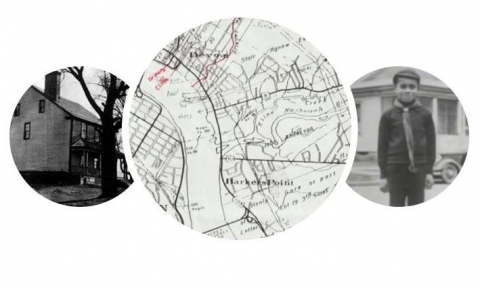
Three new sites announced for Greater Fredericton portion of GeoTour
In recognition of Black History Month, the “Atlantic Canada Hidden Histories GeoTour” is receiving $6,000 in funding from the Wicked Problems Lab at Saint Mary’s University in Halifax and the Greater Fredericton portion of the GeoTour is growing by three sites.
The funding will help support the cost of the geocache platform for the next two years, bringing awareness of historic Black communities in the Atlantic region to the public at large. It is being made available from the Wicked Problems Lab, a Saint Mary’s initiative dedicated to harnessing geomatics and other data analytical techniques to address pressing social challenges, such as the under-representation of Black communities in heritage resources.
In addition, three new geocaching sites are being announced for the Greater Fredericton portion of the GeoTour. They include:
- The Agnew Farmstead on Greenwood Drive in Fredericton
- The Making of Slavery: Caleb Jones on Main Street in Fredericton
- The O’Ree and Lawrence Families on Charlotte Street in Fredericton
To learn more about the Atlantic Canada Hidden Histories GeoTour and the Fredericton locations, visit www.TourismFredericton.ca/Geocaching.
Quotes:
- Saint Mary’s University: “The Faculty of Arts at Saint Mary’s University is thrilled to collaborate on this initiative highlighting the hidden histories of Black communities in the Atlantic region, as well as the interconnections that exist among communities in New Brunswick, Nova Scotia and beyond. These histories reveal the rich and enduring contributions of Black Canadians.” – Dr. Kirrily Freeman, Director of Outreach and Experiential Learning, Faculty of Arts, Saint Mary’s University
- Wicked Problems Lab: “Telling stories from the past is essential in strengthening contemporary communities. We are pleased to help share the histories of Black communities across the Maritimes through innovative techniques such as geocaching and digital tours, which can be accessed by local residents and visitors alike.” – Dr. Mathew Novak, Director, Wicked Problems Lab, Saint Mary’s University
- City of Fredericton: “On behalf of City Council, I extend my sincerest thanks to Saint Mary’s University for helping us to tell the stories of our Black history, not just from here in the Fredericton Capital Region, but from Nova Scotia and beyond. I also want to thank our community inclusion coordinator, Graham Nickerson, for sharing his knowledge in this area, as well as Fredericton Tourism and the Capital Region Association of Geocachers for their work on this effort.” Mayor Kate Rogers, City of Fredericton.
- Capital Region Association of Geocachers: “We are excited and honored to be involved in this initiative. Using geocaching as an educational tool for telling such important stories for the benefit of locals and tourists alike is especially gratifying. Thank you to all our partners for your support and funding. It will go a long way in helping our organization attain its goal of making the greater Fredericton area the premiere destination for geocaching in New Brunswick.” - Marion McIntyre, President, Capital Region Association of Geocachers
Background:
Atlantic Canada’s Hidden Histories GeoTour started as a collaboration between the City of Fredericton, the National Trust for Canada, the Capital Region Association of Geocachers, and the Association of Nova Scotia Geocaching.
The GeoTour, which launched in July 2022 ahead of Emancipation Day on August 1, 2022, includes stories from Greater Fredericton, NB and the southern shore of Nova Scotia. The six locations from Greater Fredericton’s Black History include:
- Salome’s Well (or Salome’s Tub) in Penniac, NB
- The Gordon House at Kings Landing in Prince William, NB
- Saint Peter’s Anglican Church on Woodstock Road in Fredericton
- The New Brunswick Sports Hall of Fame, in Downtown Fredericton
- Saint Anne’s Chapel of Ease, also in Downtown Fredericton
- The mouth of the Nashwaaksis Stream on Fredericton’s northside
The Greater Fredericton tour segment is based on research by Graham Nickerson, a PhD candidate in History at UNB and the City of Fredericton’s community inclusion coordinator.
The initial phase of the GeoTour was made possible in part by a $3,000 grant from National Trust for Canada, as well as substantial support from Fredericton Tourism. The geocaches in this tour segment were placed and will be maintained by the Capital Region Association of Geocachers.
Participants of the GeoTour can download a passport document from the Fredericton Tourism website – www.TourismFredericton.ca/Geocaching. Those who find all six geocaches will earn a geo-coin inspired by the design of an anti-slavery halfpenny.
